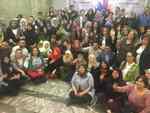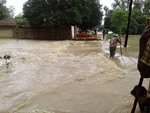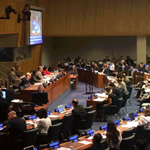Social Watch News
|
Published on Fri, 2017-09-08 09:01
» |
Published on Thu, 2017-09-07 20:27
The Iraqi Women Network held a national conference in Mosul after the city was recovered by the government, with the participation of women from various cities in Iraq, civil society activists and women who have resisted the culture of violence, exclusion and terrorism during the rule of ISIS. The conference declaration stresses Iraqi women’s determination to play a real role in the process of political reform "to eliminate the abhorrent sectarian system and combat against corruption, and insuring accountability and no impunity for the criminals or anyone involved in corruption, and building a state of institutions based on respect for human rights and the principles of citizenship and integrity." |
Published on Mon, 2017-09-04 07:52
Nepal has faced one socioeconomic shock after another in a relatively short period of time, be it the ten- year civil war or the devastating earthquake or the unstable government, which has changed 25 times since the restoration of democracy in 1990. At the end of 2015, the government introduced the Public Private Partnership (PPP) policy followed by trainings and programmes emphasizing the need for private investment to finance public services, especially for the SDGs. The ultimate need of private entities to maximize profits in order to stay in business is fundamentally incompatible with protecting the environment and ensuring universal access to quality public services. This is evident in the failure of Kathmandu Upatyaka Khanepani Ltd. (KUKL), the first PPP scheme in 2008, to deliver its promise to improve the water delivery efficiency around Kathmandu Valley. High water tariffs, undersupply of water and high deficits also shows the inefficiency of the board, chaired by the representative from a private sector, along with KUKL. |
Published on Mon, 2017-09-04 07:49
When Hungarian government officials talk about implementing the SDGs they mean less public expenditure in social sectors. Between 2010 and 2015 the Orbán government on the one hand increased state expenditures, doubled spending on the economy, and significantly increased spending by allocating about US$ 340 million annually on sports, mainly for building football stadiums. On the other hand, it decreased expenditures on public health, education and pensions. The government did not save only on pensioners, but also on unemployment benefits, by decreasing their size and duration even when they were taking place on an insurance basis. These measures decreased annual family support expenditures as well, which can be explained by a decrease in the number of children and the decades-long freeze in services. Social benefits were decreased, while extreme poverty increased over the past eight years. |
|
Published on Fri, 2017-09-01 00:00
» |
|
Source: . Published on Fri, 2017-09-01 00:00
The Spotlight Report on Sustainable Development 2017 : “Reclaiming policies for the public” - - published on the opening day of the High Level Panel on Sustainable Development in New York, USA - - provides a extensive assessment of the 2030 Agenda and the Sustainable Development Goals (SDGs). |
|
Source: . Published on Fri, 2017-09-01 00:00
Privatization, partnerships, corporate capture, and their impact on sustainability and inequality In the 2030 Agenda governments committed to a revitalized Global Partnership between States and declared that public finance has to play a vital role in achieving the SDGs. But in recent decades, the combination of neoliberal ideology, corporate lobbying, business-friendly fiscal policies, tax avoidance and tax evasion has led to a massive weakening of the public sector and its ability to provide essential goods and services. |
Published on Thu, 2017-08-31 13:36
Growing global interdependence poses greater challenges to policymakers on a wide range of issues and for countries at all levels of development. Yet, the new mechanisms and arrangements put in place over the past four decades have not been adequate to the growing challenges of coherence and coordination of global economic policymaking. Recent financial crises have exposed some such gaps and weaknesses. |
Published on Thu, 2017-08-31 12:30
Following 8 days involving 43 Voluntary National reviews (VNR) and 147 side events with 77 ministry-level participations and 2458 registered stakeholder representatives, the statistical outlook of the 2017 High-Level Political Forum on Sustainable Development Goals is quite promising. It is only the second review and just two years after the kick-off for the implementation of a universal agenda towards leaving no-one behind. Yet, time is marching on and there is a long way to go on the level of implementation. At the 2017 HLPF, Jordan became the third country from the Arab region to participate in the VNR process; following Egypt and Morocco in the 2016 review. The first words of Jordan’s national report made reference to the same issues: ‘the power of working together’ and taking into consideration ‘the urgent world issues’. |
|
Published on Fri, 2017-08-25 11:33
» |
SUSCRIBE TO OUR NEWSLETTER









